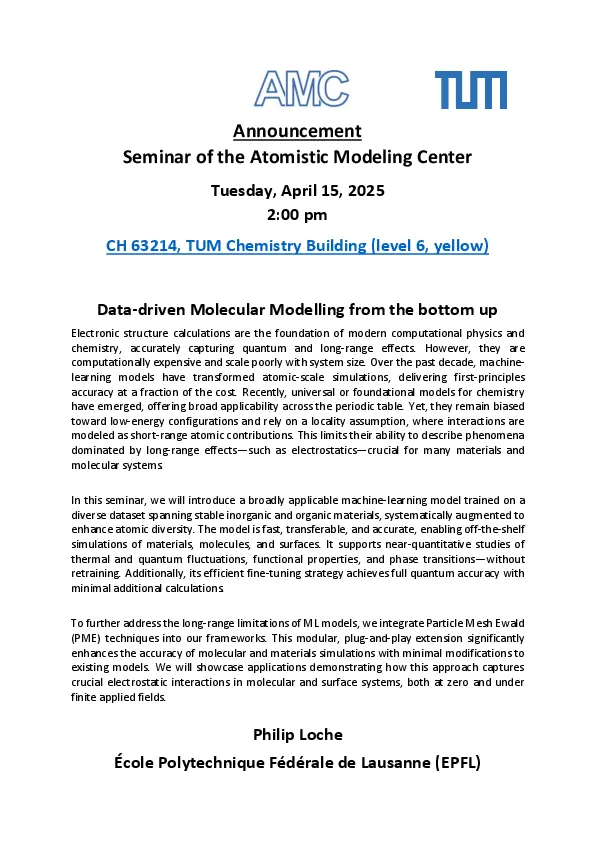Beginning with this talk, AMC is offering a Seminar Series on Atomistic Modeling this summer semester!
First speaker will be Dr. Philip Loche from the Laboratory of Computational Science and Modeling COSMO at the École Polytechnique Fédérale de Lausanne (EPFL). In his talk on "Data-driven Molecular Modeling from the bottom up", Loche will introduce a broadly applicable machine-learning model trained on a diverse dataset spanning stable inorganic and organic materials, systematically augmented to enhance atomic diversity.
Date: April 15, 2025, 2 - 3 pm
Location: CH 63214, TUM Chemistry Building (level 6, yellow)
Stream on zoom with this link:
https://tum-conf.zoom-x.de/j/66435334724?pwd=Ma0bRIPV2Y9L09fNqBK8ScaXy3g5tX.1
(Meeting ID: 664 3533 4724, Passcode: 123123)
Abstract:
Electronic structure calculations are the foundation of modern computational physics and chemistry, accurately capturing quantum and long-range effects. However, they are computationally expensive and scale poorly with system size. Over the past decade, machine-learning models have transformed atomic-scale simulations, delivering first-principles accuracy at a fraction of the cost. Recently, universal or foundational models for chemistry have emerged, offering broad applicability across the periodic table. Yet, they remain biased toward low-energy configurations and rely on a locality assumption, where interactions are modeled as short-range atomic contributions. This limits their ability to describe phenomena dominated by long-range effects—such as electrostatics—crucial for many materials and molecular systems.
In this seminar, we will introduce a broadly applicable machine-learning model trained on a diverse dataset spanning stable inorganic and organic materials, systematically augmented to enhance atomic diversity. The model is fast, transferable, and accurate, enabling off-the-shelf simulations of materials, molecules, and surfaces. It supports near-quantitative studies of thermal and quantum fluctuations, functional properties, and phase transitions—without retraining. Additionally, its efficient fine-tuning strategy achieves full quantum accuracy with minimal additional calculations.
To further address the long-range limitations of ML models, we integrate Particle Mesh Ewald (PME) techniques into our frameworks. This modular, plug-and-play extension significantly enhances the accuracy of molecular and materials simulations with minimal modifications to existing models. We will showcase applications demonstrating how this approach captures crucial electrostatic interactions in molecular and surface systems, both at zero and under finite applied fields.
